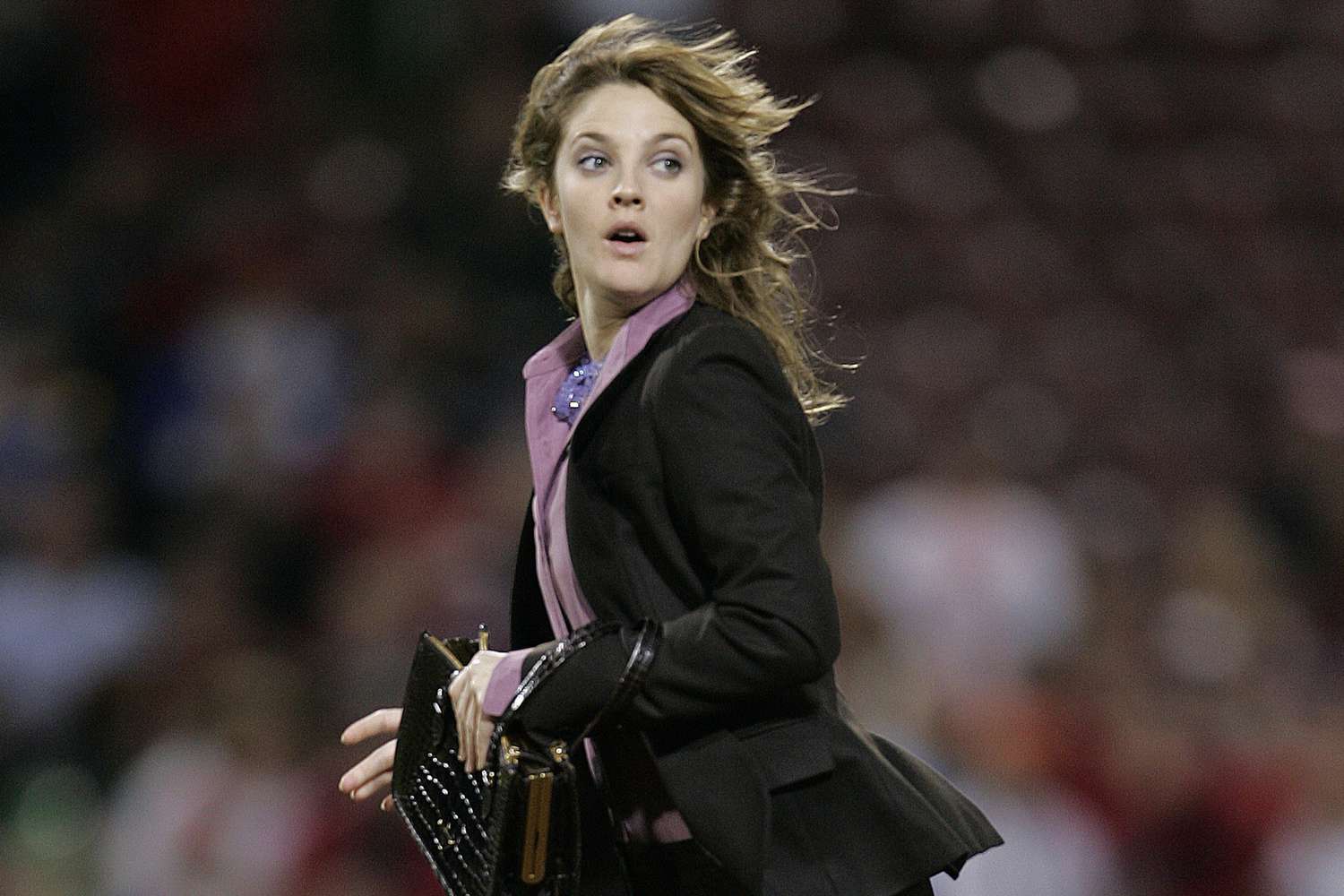Table of Contents
The Fall That Still Hurts
Even after two decades, Drew Barrymore still feels physical pain caused by the filming of one of the Fever Pitch scenes. This was a most demanding and unexpectedly painful scene that she has, probably for the rest of her life. The moment when she runs barefoot into the outfield at Fenway Park might have been a grand success on screen but it was a complete disaster for Barrymore behind the screen. The movie, as it rejoices the 20th year since its release, she recounts that terrible day on the film set when her still-existing injuries resulted from her serious fall.
Drew Barrymore recalled how the scene required her to climb the famous Green Monster wall before taking a dramatic tumble. Unfortunately, the fall wasn’t just an acting stunt, it turned out to be quite real, and it left her wincing and screaming. Fever Pitch, based on Nick Hornby’s ‘1992 novel of the same name, brought together Drew Barrymore and Jimmy Fallon in a sports-themed romantic comedy that quickly became a fan favorite. The film follows the complex yet charming relationship between Lindsey, a driven and stylish executive played by Barrymore, and Ben, her fun-loving but Red Sox-obsessed boyfriend portrayed by Fallon.
:max_bytes(150000):strip_icc()/fever-pitch-jimmy-fallon-drew-barrymore-040325-78205d06178a4eb3aab283270e5aea3a.jpg)
Their relationship is constantly tested by Ben’s deep love for baseball, especially when it comes to his precious season tickets. In an emotional turning point, Ben decides he’s willing to give up those tickets to prove to Lindsey that he’s serious about their future together. This decision sets the stage for one of the film’s most memorable moments: Lindsey’s dramatic dash across the field to stop him from selling them. The entire scene serves as a symbol of commitment and understanding in relationships, but for Barrymore, it was more than just a powerful emotional moment.
Fever Pitch’s Enduring Legacy
Although the heartfelt dash onto the Fenway Park field was meant to be a grand romantic gesture in the movie, the behind-the-scenes reality told a much different story. Barrymore explained that during the scene where she climbs the Green Monster and then runs onto the field, she fell flat on her back—and it wasn’t a controlled stunt. The pain that followed wasn’t acting, and the expression on her face as she winced and cried out was entirely genuine. She had no choice but to continue the scene, even though her back was already in serious pain.
The result was a powerful performance that felt real to audiences—because it was. To this day, she still experiences back pain and finds herself wondering whether it all began on that exact day of filming. With 20 years having passed since Fever Pitch was released, the fans pay a visit to the moments in the movie that were made unforgettable, such as the genuine performances and the chemistry between Barrymore and Fallon. While the film mixed romance with a passion for baseball, the true stories behind the scenes bring another layer of appreciation for what the actors did to represent those moments.
For Barrymore, it was not just a part—it was an experience that had a real-time and an everlasting effect that could hardly be put into words. Despite being in pain, her commitment to the scene is the best example of her as an actress which is devoted to her work and has the potential to be totally absorbed into the role. In the middle of all that, the film stays everyone’s dearest, and Barrymore’s real-life stumble is still a testimonial of how far along actors have to go to create magic on the screen.
More Than Just a Love Story
Now at 50 years old, Drew Barrymore—who not only starred in Fever Pitch but also served as a producer—still wholeheartedly believes in the enduring love between Ben and Lindsey, the central couple in the beloved film. In her eyes, their romance didn’t end when the credits rolled. In fact, she imagines that the pair are still very much together, thriving in their relationship while continuing to attend games and build a life rooted in mutual acceptance. “I think so, absolutely. And going to the games and living their life,” she said when asked if the couple would still be going strong today. Her optimism isn’t just sentimental—it reflects a deeper hope that the story serves as a metaphor for real-life relationships.
Barrymore hopes the film resonates with couples who are learning how to live with and love one another’s quirks, passions, and yes, even baggage. Because, as she wisely points out, “no one’s coming in with no baggage!” The beauty of Ben and Lindsey’s relationship lies in how different their “baggage” truly is. Lindsey, a focused and high achieving executive, pours herself into her career, striving to maintain her professional success and independence. Ben, on the other hand, is completely wrapped up in his lifelong devotion to the Boston Red Sox, a passion that dominates not only his free time but his entire emotional world.
These deeply rooted priorities are not easily reconciled—and that’s exactly what makes their story relatable. It’s a dynamic many couples face in real life: how do you blend two very different lifestyles into one shared path? Throughout the film, Lindsey wrestles with that exact question, trying to understand how someone can be so consumed by something that she, at times, finds trivial or even frustrating.
Fear, Compromise, and Real Connection
One of the film’s most poignant moments comes when Lindsey articulates a very real fear: that Ben’s love for the Red Sox could one day overshadow the major moments in their lives together. It’s not just about missing dinner dates or casual plans—it’s about the big stuff. “As Drew Barrymore once said, ‘Imagine if my worry is not due to fear that you won’t be there when I’m giving birth, because you have a game?’” Barrymore explains. This concern goes beyond games; it delves into being available. Yet even in voicing that concern, there’s space for compromise.
Barrymore continues, “So be there when I’m giving birth, but then we’ll go to the game with our baby, and this will be a big part of our lifestyle.” This thought beautifully captures the give and take that every successful relationship requires. It’s not about eliminating the things that make your partner unique, it’s about finding ways to combine them into your life together. Barrymore admires how Fever Pitch tackled such an honest, down to earth issue in a fun and emotionally way. For her, the story wasn’t just about baseball or romance—it was about understanding and navigating obsession, routine, and identity within a relationship.
“And I just thought it was so real, the thing that someone is obsessed with, and lives their life by… how are you going to navigate that as a couple?” she says. This kind of story doesn’t rely on fairytale endings or over-the-top gestures. Instead, it focuses on the work it takes to build something lasting. And even though it’s wrapped in the humor and charm of a romantic comedy, Fever Pitch leaves audiences with a very grounded message: love isn’t about changing someone. It’s about accepting their world and choosing to live in it—together.
A Joyful Journey On Set
For Drew Barrymore, one of the most appealing aspects of the work on Fever Pitch was the remarkable experience she had with Jimmy Fallon during the shoot. Remembering those times, she says they were “the best time making” the film. Their excitement was not limited only to the fact that they had to do their job or that they performed the scenes well—it also was coming from the vibe on set, the friendships that developed, and the deep sense of collaboration that made every single moment so unique.
:max_bytes(150000):strip_icc()/fever-pitch-drew-barrymore-jimmy-fallon-040325-53012c47c31d46a9bb4102897a940c71.jpg)
The film was even more cherished by Barrymore because it was directed by the Farrelly brothers, the iconic duo that made some of her all-time favorite movies. It was a real life experience to work under their direction. Barrymore, who had enjoyed the Farrelly brothers’ funny and atypical sense of humor in movies like Kingpin and Dumb and Dumber for a long time, was quite surprised by the way they changed the perspective of the movie Fever Pitch. The humor in the film was toned down; at the same time, it also displayed a more serious and emotional side of the filmmakers.
“I adored so much that the Farrelly brothers, my favorite directors, were so sweet and they made a movie that was just perfect comedy, but I thought very gentle and emotional,” she said with a visible glow of praise. It was a shift she wasn’t expecting, and one that made her respect them even more. She added, “I was so happy to see that side of them because they are those guys and I was like, ‘Wow, the Farrelly brothers with heart, man. This is awesome.’” That rare combination of humor and heart left a lasting impression on her, and it elevated the entire experience of making the film.
Love Behind the Scenes
Even beyond the script and the creative process, Fever Pitch holds an extra layer of meaning for Drew Barrymore—one rooted in real-life love. One of her most cherished memories from recording was not about her role or even the film’s plot; it was witnessing the emergence of a beautiful relationship between her producing partner and close friend Nancy Juvonen and Jimmy Fallon. Juvonen, who co-created Flower Films with Barrymore, started dating Fallon during the filming of Fever Pitch.
What makes it even more touching is how personally Barrymore feels connected to their love story. She doesn’t just look back on it as a fond memory—she sees it as one of the most important and rewarding outcomes of her entire involvement in the film. “The person who changed my life in the most dramatic way, I got to somehow be in something that helped her find happiness,” she said with heartfelt sincerity. Nancy Juvonen isn’t just a colleague to Barrymore—she’s someone she loves dearly.
Ultimately, Fever Pitch is not just another romantic comedy in Drew Barrymore’s incredible list of movies. She sees in it the power of love, happiness, and deep, real-life connections—both on-screen and off. It is a message that sometimes, life puts together the right people at the right time, and beautiful things happen. “It’s the best when you want people you love to be happy, and you get to witness it starting,” she said, still quite emotional about the news. And for her, the film will always be more than just a romantic sports movie. “Fever Pitch, to me, is the promise that good things happen to good people,” she said. That belief, that hope, and that memory continue to make the film a special, enduring chapter in her life.



